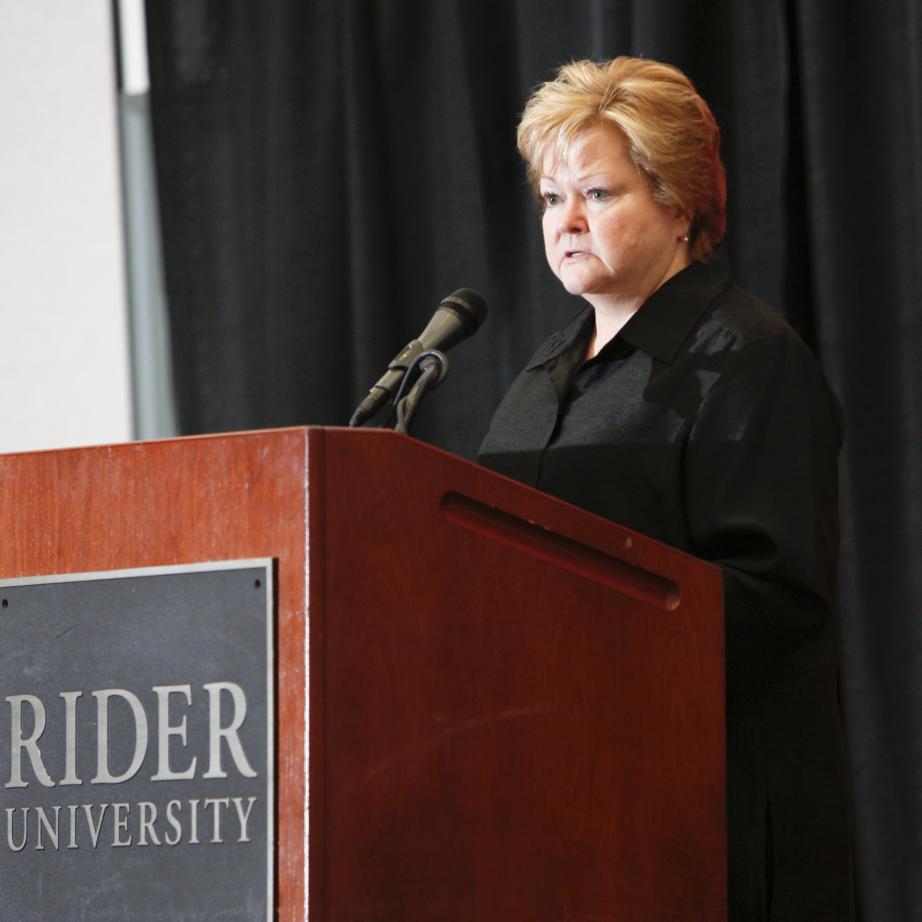Friday, Oct 28, 2011
Thirteen years after her son, Matthew, was targeted for a fatal beating simply for being gay, Judy Shepard told a Unity Days audience that ignorance remains the biggest enemy of tolerance and understanding.
by Sean Ramsden
Judy Shepard says living life in the closet isn’t helping anyone.
Men and women who cloister away their sexual orientation, whether for shame or convenience, do themselves and the greater society a disservice, according to Shepard. Instead, she says, a broader familiarity would go a long way toward promoting a greater understanding of homosexuality.
“You have to tell your stories, and explain about what your love life is like,” said Shepard, who told the audience to disregard those who “don’t want that in our face. Do heterosexuals hide their lives from their friends? No, so why should you? You are who you are, and you love who you love, and that’s the way it is.”
Shepard was on Rider’s Lawrenceville campus to deliver the keynote address for the University’s annual Unity Days celebration on Wednesday, October 26, before a capacity audience in the Bart Luedeke Center Cavalla Room. The event was sponsored by the Center for Multicultural Affairs.
“We learn hate and prejudice from our environment, from our families and the elements around us,” said Shepard, whose 21-year-old son, Matthew Shepard, was brutally beaten to death in 1998, tortured, tied to a fence and left to die by two men near Laramie, Wyo. “These two men learned it was OK to hate. They learned it. And all our hopes (for Matthew) were killed for $20 and some twisted reason known only to his killers.”
In the time since Matthew’s death, Shepard and her husband, Dennis Shepard, dedicated themselves to promoting tolerance, and lobbied for legislation to protect victims of bullying and bias crimes. The U.S. Congress passed the Matthew Shepard and James Byrd Jr. Hate Crimes Prevention Act in October 2009, which was signed into law by President Obama days later. Byrd, an African-American man from Texas, was murdered by three white men in a racially motivated crime that horrified the nation in 1998.
Shepard began her address at Rider by reading the victim’s impact statement she read at the sentencing of Russell Henderson, one of the two men convicted of killing Matthew. She described how she and her husband desperately raced from their home in Saudi Arabia to the hospital in Fort Collins, Colo., where their son lay near death. When Matthew finally succumbed to his injuries five days after being beaten, Shepard was keenly aware that her life would never be the same.
“There was relief that he was no longer suffering,” she said. “But we also knew that ours was just beginning.”
By December 1998, the Shepards had founded the Matthew Shepard Foundation, which aims to erase hate, bigotry and intolerance in society, particularly toward the gay, lesbian, bisexual and transgender population. For as hard as she has worked to make sure her son’s death was not in vain, Shepard said the fact that Matthew came out to her years before he died has made all the difference to her.
“I’ll tell you that I would not be here today if we had only found out he was gay when he died,” she said, explaining that it was the openness and trust in their relationship that made them so close. “When he was 18, he called me on the phone, and said, ‘Mom, I have something to tell you – I’m gay.’ I said, ‘What took you so long to tell me?’
“We all know if someone we love is gay; we know it here,” Shepard continued, gesturing toward her head as if to suggest the back of her mind. “But the hard part is bringing it up here (to the front). It’s hard because it takes action and commitment.”
Shepard willingly concedes that not everyone who reveals their homosexuality is guaranteed acceptance, but, “You have to figure it out,” she said. “Who is toxic in your life, and who is going to help you grow.”
In her talks, Shepard routinely encounters people who have hidden their entire lives from the people who care most about them.
“I’ve had 60-year-old men who still live with their mothers tell me I gave them the courage to come out to them, and that makes me sad, actually,” Shepard explained. “You really don’t think she knows? What you’ve been doing by not letting her into your life is breaking her heart.”
Still, Shepard lamented the fact that laws in many places are still lagging, and that in 30 states, a person can still be fired from his or her job for being gay.
“It’s hard to put your life or your career on the line, out of fear,” said Shepard, who recalled a quote from Dr. Martin Luther King. “He said, ‘It’s not the words of our enemies we’ll remember; it’s the silence of our friends.’”

